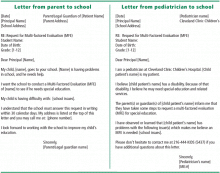Learning disorders: How pediatricians can help
ABSTRACTLearning disabilities are common and can negatively affect the individual and, ultimately, society. Pediatricians should be able to identify the risk factors for learning disabilities, recognize the early warning signs, and apply the appropriate diagnostic tools. Pediatricians also can play a crucial role by encouraging schools to provide accommodations for the child, requesting multifactorial evaluations from the school district, and referring patients for detailed neuropsychological evaluation outside the school district when appropriate. Information from the pediatrician can help the school formulate an individualized education plan for the child. Additionally, the primary care pediatrician can support families with referrals to appropriate healthcare specialists.
Disagreement
There are options when the family and school disagree on the assessment outcome or the extent of an IEP plan. It is usually beneficial for the family to accept the IEP so that something is in place for the child while attempts are made to resolve the issue. In some cases, the family may choose to pursue their state-specific appeals process or mediation and/or to proceed to litigation. They also have the right to pursue independent assessment of their child’s suspected learning disability; however, this is an out-of-pocket expense that may not be covered by health insurance. Furthermore, the school is not required to accept independent assessor results or recommendations.
There may be benefits from independent neuropsychological evaluations because most school districts do not have access to neuropsychologists. Neuropsychological evaluations can provide a detailed assessment of higher-level cognitive abilities, such as executive function, memory, visual-spatial processing, visual-motor processing, language function, effort, and attention.
THE PEDIATRICIAN’S ROLE
School communication
The pediatrician can play a key role in requesting the initial multifactorial learning disability assessment on behalf of the family. Cleveland Clinic has template letters available for both the parents and the pediatrician to send to the school that can be adapted (Figure 1). Both should state the suspected learning disability ing disabilities and problems and should be addressed to the school principal.
Pediatricians can also communicate with the teacher about classroom strategies before an IEP or 504 Plan is determined, in order to help set the context of what may be coming. Surprisingly, many teachers are unfamiliar with requirements made for learning-disabled students, such as the benefits of seating the child toward the front of a class.
Talk to the child
The pediatrician should emphasize to the child that everyone learns differently and in a way best suited to him or her. The child should know that everyone’s brain works differently, and every child should try to work hard at school because it is their job in life at that age. Children can relate to an analogy that the brain is like a computer, with some models being faster than others and analyzing data differently.
Parents can help children build on their natural strengths and talents despite the learning disability. Point out that some children are good at math, others at reading, and some mainly excel at sports or the arts. It may be helpful to provide real-life examples of people who are successful despite learning disability, such as a celebrity with dyslexia.
Talk to the parents/guardians
Parents/guardians need to know that learning disability is not the result of poor parenting. Moreover, emphasize that the child is not lazy or stupid and that the condition can be very exhausting and frustrating for the child. Their child will have good and bad days, much like they do at their own work. Patience, rather than force, should be stressed.
Encourage parents to find alternative ways to teach their child that make it easier for them to learn. Online education programs may serve as beneficial supplements for these children, and field trips can provide more hands-on learning. In addition, talk to parents about the need for additional, independent testing and be able to refer them to appropriate sources for such testing as well as to neuropsychological resources, when warranted.
CONCLUSION
As families increasingly turn to pediatricians to address learning disabilities and problems children are having at school, physicians need to understand the various diagnoses and be able to assist with proper assessments. While schools must provide modifications when a diagnosis is made, there is sometimes disagreement about what the specific learning disability is and its extent of involvement in the child’s education. Diagnosing and addressing learning disability early can lessen various behavioral problems, help prevent dropping out of school, and enhance life outcomes for the child.







